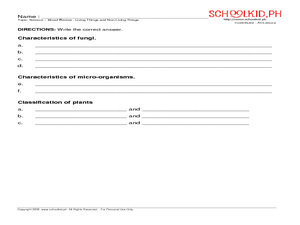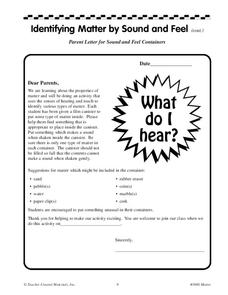Curated OER
Science – Scientific Method
In this scientific method worksheet, students record the steps of the scientific method in order and then respond to 5 multiple choice questions regarding the scientific method.
Curated OER
Science - Mixed Review: Living Things and Non Living Things
In this living and non living things worksheet, students fill in a mixed review that has them answering questions in the true and false, short answer, and classification formats. Students answer 59 questions.
Curated OER
What Makes A Community Sustainable
For this environment worksheet, students read three different case studies in order to apply them to the categories of finding the best possible choices to make for helping a community flourish.
Curated OER
What Are Fossils?
In this fossils worksheet, students will review the 4 steps necessary to create a fossil. Students will fill in the blank of 4 statements in this graphic organizer.
Curated OER
Is There a Tenth Planet?
In this planets learning exercise, learners read about how our solar system's planets were discovered and how scientist believe there might be a tenth planet. After reading, students complete 4 short answer questions.
Curated OER
Physics Rules and S.I. Units Game
For this physics rules worksheet, students complete questions and answers in order to review physics rules with each other. Students complete 26 questions.
Curated OER
Living World Quiz 2
In this living world worksheet, students answer short answer questions about animals, the human body, food, and more. Students complete 20 short answer questions.
Curated OER
Climatic Changes
Investigate the greenhouse effect and global warming with this weather worksheet: scholars describe the seasonal variations of temperature and day length at its greatest and its least. Then they describe the effects of El Nino and how...
McGraw Hill
Chapter 20: Arthropods and Echinoderms
Learn all about echinoderms and arthropods through the attached reading, complete with stunning photographs and review questions; keep track of the key concepts using the handout. For kids with a lower reading level, consider projecting...
Curated OER
Life on the Ocean Floor
Why would water 2700 meters deep suddenly become warmer? Explore this and other ocean floor discoveries through this reading response worksheet. Scholars read information about the organisms discovered by Alvin, a deep-sea submersible....
Curated OER
Viruses and Bacteria
A series of questions about archaebacteria and eubacteria reinforce a chapter on viruses and bacteria. This worksheet is from chapter 18 of an unspecified textbook, but could work with your biology lecture as well. High schoolers...
Curated OER
Forces in Liquids
In this forces in liquids learning exercise, learners read their notes and answer short answer questions about forces in liquids. Students complete 6 questions total.
Curated OER
Amphibians and Reptiles
Compare and contrast reptiles and amphibians using a reading guide handout. Although it is designed to accompany a particular textbook, most reading or video selections covering these types of animals will go over the same facts. If you...
Curated OER
The Ocean Floor and Shore Zones
Make textbook reading more engaging using this reading activities instructional activity, through which scholars review major features found on the ocean floor and the processes that formed these features. They complete 11 terms in a...
Curated OER
Atomic Mass, Moles, and the Periodic Table
In this periodic table activity, students review atomic mass, molar mass, and percent composition of compounds. Then students complete 4 problems.
Curated OER
Modeling the Cell Membrane
For this membrane permeability worksheet, students read introductory information about the cell membrane structure as it pertains to permeabillity and draw a representation of the membrane as they complete a lab. Students record the...
Curated OER
The Beluga Whale, Otters
In these internet activity worksheets, students complete research related to the Beluga Whale and otters. Student are able to answer questions by following directions to help them navigate around a website.
Curated OER
Mollusks and Segmented Worms
Keep clam and read on! After reading the textbook selection about mollusks and worms in the additional materials section, your young zoologists check their comprehension by answering the questions on the handout found here. To...
Curated OER
Typical Animal Characteristics
How is an animal formed? Scientists use a diagram to examine early post-fertilization stages, and the creation of the blastula. They look at a second diagram to observe the transition from the blastula to a gastrula. Three comprehension...
US Fish and Wildlife Service
Endangered Species
This handout goes along with the slide show linked at the top of the of the resource. Depending on the computer availability in your school, this could be a WebQuest in which learners go through the slide show at their own pace, or...
Curated OER
Identifying Matter by Sound and Feel
In this identifying matter by sound and feel worksheet, students participate in an experiment to identify a wide variety of different types of matter in film containers supplied by each student.
Curated OER
Energy and Life
This two-page quiz mostly covers ATP, but touches on autotrophs and heterotrophs, as well. Learners show what they know through multiple choice, fill-in-the-blank, and short-answer questions.
McGraw Hill
Chapter 21: Mammals
Although the instructional activity found here is designed to accompany a particular textbook reading, it is a good basic review or study guide when learning about mammals. If you have a text that covers these concepts, young scientists...
Curated OER
Unit 7 Acid and Base
A series of 25 multiple choice questions is presented to chemistry learners to review properties of acids and bases. A page of notes precedes the questions and contains information about the Arrhenius and Bronsted-Lowry definitions,...























